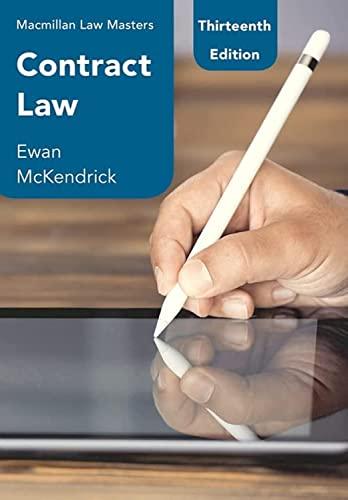
IRAC Case Analysis Rubic to analyze this case
- I: What are the FACTS and the Legal Issue in This Case?
- R: What is the Rule (law) of the Case?
- A: What is the Court's Analysis and Rationale?
- C: What Was the Conclusion or Outcome of the Case?
Jewish Federation of Greater Des Moines v. 52 UCC Rep. 2d 422 (Iowa Ct. App. 2003) Cedar Forrest Products Co. Cedar Forrest Products Company (CFP ) manufactures precut building packages for shelters, pavilions, gazebos, and other structures typically utilized in park, camp, and recreational facilities. The Jewish Federation of Greater Des Moines (Jewish Federation) contracted with CFP for the manufacture of a 3,500-square-foot building with unique and customized features. With the signing of the Purchase and Sales Agreement, Jewish Federation sent CFP a deposit of $53,605; shortly thereafter, it prematurely sent the remaining balance of $160,813 for a total contract price of $214,418. After a series of redesign discussions and change orders, Jewish Federation informed CFP it was rescinding the contract and requesting return of all monies paid. CFP returned $160,530.54, but retained $53,887.46 as lost profits it would have made had Jewish Federation not breached the contract. In anticipation of the building project, CFP purchased cedar paneling, insulation, floor plywood, and cedar timber. It had not begun to assemble the building when Jewish Federation breached the contract. After the breach, CFB was able to sell the purchased items to other customers for the same price as called for in the Jewish Federation contract. Jewish Federation filed an action for the return of the remaining $53,887.46, claiming there had been no meeting of the minds and the agreement was merely a quote based on a preliminary schematic drawing; CFP counterclaimed for breach of contract. The trial court found the agreement was a completely integrated contract that Jewish Federation had Page 658 breached and determined that CFP was entitled to retain $13,470.13 only for "incidental damages." CFP appealed. Vogel, Presiding Judge The primary issue on appeal is the proper measure of damages for a lost volume seller under these particular circumstances. The Illinois Uniform Commercial Code, like the Uniform Commercial Code (UCC), provides for liberal administration such that "the aggrieved party may be put in as good a position as if the other party had fully performed. . . ." According to the Illinois Code, [The measure of damages for non-acceptance or repudiation by the buyer is the difference between the market price at the time and place for tender and the unpaid contact price together with any incidental damages provided in this Article (Section 2-710), but less expenses saved in consequence of the buyer's breach.Section 2-708(1). However, if this amount is inadequate to put the seller in as good a position as performance would have done then the measure of damages is the profit (including reasonable overhead) which the seller would have made from full performance by the buyer, together with any incidental damages provided in this Article (Section 2- 710), due allowance for costs reasonably incurred and due credit for payments or proceeds of resale. Section 2-708(2). To resolve this issue, we look to case law construing the Illinois statute or similar statutory law in other jurisdictions. In R. E. Davis Chem. Corp. v. Diasonics, Inc. (N.D. III. 1987), the court used lost profits as the measure of damages pursuant to section 2-708(2) after the buyer repudiated. For the seller to recover lost profits, the court reasoned that the seller must establish that (1) it had the capacity to make the sale to the buyer as well as the sale to the resale buyer and (2) it would have been profitable for it to make both sales. Applying this test to the present case, the record reflects CFP was capable of manufacturing the building for Jewish Federation as well as its numerous other customers and it would have been profitable to do so. Jewish Federation argues that CFP had not begun to assemble the purchased items into the contracted for building at the time of breach, therefore incidental damages were sufficient. However, this position is not supported by case law. Lost profits may be awarded for items yet to be manufactured. [Citations omitted.] The rationale for these holdings appears to be that a lost volume seller can handle a certain number of sales during the year and when one negotiated sale is lost, the seller simply cannot recoup that anticipated profit. Instead, the seller is one sale short of normal capacity. So to put the seller in the position he would have been but for the breach, the Illinois statute provides the seller a remedy which includes the anticipated profit as well as incidental expenses and costs incurred. As a lost volume seller, CFP is entitled to its lost profits of $53,887.46 pursuant to Section 2-708(2) which includes the incidental damages of $13,470.17 awarded by the district court. Judgment reversed in favor of CFP









